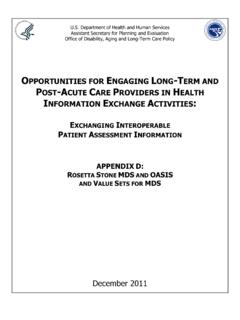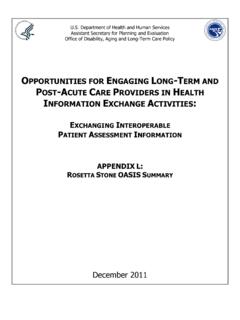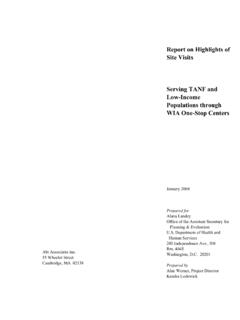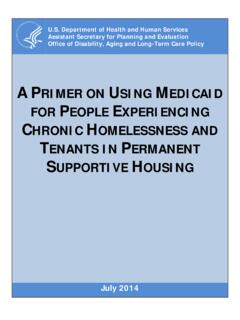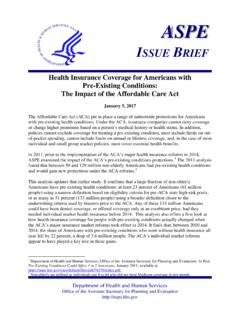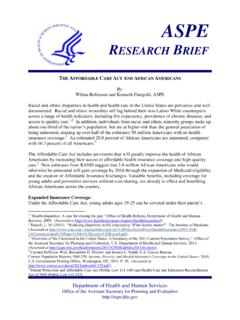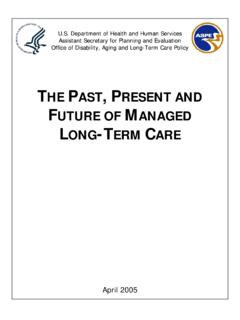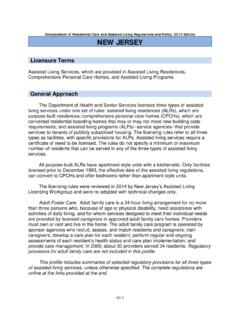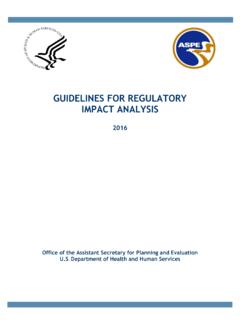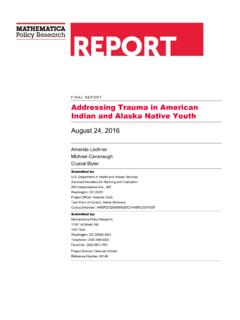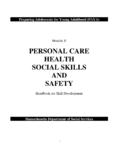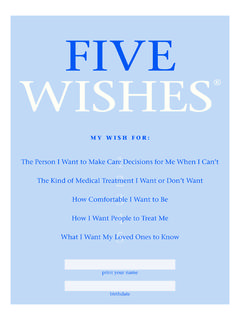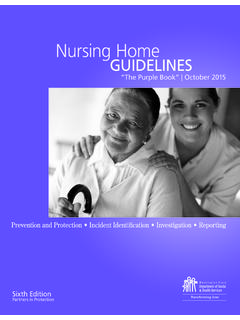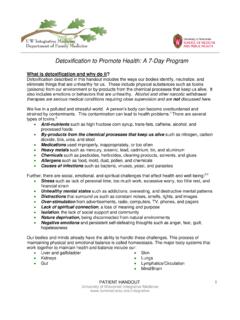Transcription of Residential Care/Assisted Living Compendium: Texas - ASPE
1 TX-1 Compendium of Residential Care and Assisted Living Regulations and Policy: 2015 Edition Texas Licensure Terms Assisted Living Facilities General Approach The Texas Department of Aging and Disability Services (DADS) licenses several types of assisted Living facilities (ALFs): assisted Living apartments (single-occupancy), Residential care apartments (double-occupancy), and Residential care non-apartments. A person establishing or operating a facility that is not required to be licensed may not use the term "assisted Living " in referring to the facility or the services provided. The ALF statute requires careful monitoring to detect and report unlicensed facilities. A facility's licensure type--A or B--is based on residents capability to evacuate the facility.
2 Any facility that advertises, markets, or otherwise promotes itself as providing specialized care for persons with Alzheimer's disease or other disorders must be certified as such and have a Type B license. Adult foster care (AFC) provides a 24-hour Living arrangement with supervision in an adult foster home for people who are unable to live independently in their own homes because of physical, mental, or emotional limitations. Providers and residents must live in the same household and share a common Living area. With the exception of family members, no more than three adults may live in the foster home unless it is licensed as a Type C ALF, which is a four-bed facility that must have an active contract with the Department to provide AFC services before it can be licensed.
3 A provider wishing to serve more than four individuals must obtain a DADS Type A ALF license. Separate rules apply to adult foster homes and Type C facilities, which are not included in this profile, but a link to the provisions can found at the end. This profile includes summaries of selected regulatory provisions for Type A and Type B ALFs. The complete regulations are online at the links provided at the end. Definitions Assisted Living facility means an establishment that furnishes, in one or more facilities, food and shelter to four or more persons who are unrelated to the proprietor and provides personal care services, supervision or direct administration of medications, and other permitted services.
4 TX-2 Resident Agreements Facilities must have a written admission agreement with each resident that includes information about the services to be provided and their cost. Disclosure Provisions The facility must have written policies regarding aging in place, admission criteria, services provided, charges, refunds, the normal 24-hour staffing pattern, residents responsibilities and privileges, and other rules and regulations. Before admitting a resident, facility staff must explain and provide a copy of the disclosure statement to the resident, family, or responsible party and must also provide a copy of the Resident Bill of Rights. An ALF that provides brain injury rehabilitation services must attach to its disclosure statement a specific statement that licensure as an ALF does not indicate state review, approval, or endorsement of the facility's rehabilitative services.
5 The facility must document receipt of the disclosure statement. If the facility provides services and supplies that could be covered Medicare benefits, the facility must disclose this information to the resident. Facilities that provide care to residents with Alzheimer's disease or other dementias are required to disclose the services they provide using a DADS disclosure form, which includes the pre-admission and admission processes, discharge and transfer, planning and implementation of care, change in condition issues, staffing and staff training in dementia care, and the physical environment. The facility must give the required DADS disclosure statement to any individual seeking information about the facility's care or treatment of residents with Alzheimer's disease or other dementias.
6 The disclosure statement must be updated and submitted to the Department as needed to reflect changes in special services for residents. Prior to admitting a resident to the facility, staff must discuss and explain the information in the disclosure statement with the family or responsible party. Admission and Retention Policy In a Type A ALF, a resident must be mentally and physically capable of evacuating the facility unassisted in the event of an emergency and capable of following directions, and must not require routine attendance during sleeping hours. In a Type B ALF, a resident may require staff assistance to evacuate the facility, be incapable of following directions under emergency conditions, require attendance TX-3 during sleeping hours, and may not be permanently bedfast but may require assistance in transferring to and from bed.
7 All residents must be appropriate for the facility licensure type when admitted. After admission, if the resident s condition changes, the resident may no longer be appropriate for the facility s license, and if so, the facility is not required to retain them. The regulations list some general characteristics of residents in an ALF, including residents who: (1) exhibit symptoms of mental or emotional disturbance, but are not considered at risk of imminent harm to self or others; (2) need assistance with mobility, bathing, dressing, and grooming; (3) need reminders to encourage toilet routine and prevent incontinence; (4) need assistance with medication , supervision of self- medication , or administration of medication ; or (5) are incontinent without pressure sores.
8 A facility must not admit or retain a resident whose needs cannot be met by the facility or who cannot secure the necessary services from an outside resource. As part of the facility's general supervision and oversight of the physical and mental well-being of its residents, the facility remains responsible for all care provided in the facility. If the individual is appropriate for placement in a facility, then the decision that additional services are necessary and can be secured is the responsibility of facility management with written concurrence of the resident, resident's attending physician, or legal representative. If the Department or an ALF determines that a resident is inappropriately placed in the facility, or if a resident experiences a change of condition, but continues to meet the facility evacuation criteria, as long as the facility is willing the resident may be retained if certain conditions are met, including: (1) a physician describes the resident's medical conditions and related nursing needs, ambulatory and transfer abilities, and mental status, and states that the resident is appropriately placed; and (2) the resident or a legal representative desires retention in the facility.
9 If the DADS surveyor or an ALF determines that a resident is inappropriately placed because the resident no longer meets the evacuation criteria, a facility may request that the resident remain at the facility by obtaining an evacuation waiver and providing a detailed emergency plan that explains how the facility will meet the evacuation needs of the resident, which includes provisions for a sufficient number of trained staff on all shifts to move all residents to a place of safety. The facility must meet the previously listed conditions and submit additional information. Services ALFs provide personal care, including assistance with activities of daily Living (ADLs); general supervision or oversight of the physical and mental well-being of a person who needs assistance to maintain a private and independent residence in the TX-4 facility or who needs assistance to manage his or her personal life; and supervision or direct administration of medications.
10 The facility must also provide an activity and/or social program for residents at least weekly. An ALF may provide skilled nursing services for limited purposes: (1) coordinating resident care with an outside home and community support services agency or health care professional; (2) providing or delegating personal care services and medication administration; (3) assessing residents to determine required services; and (4) delivering, for a period not to exceed 30 days, temporary skilled nursing services for a minor illness, injury or emergency. Facilities that provide care to residents with Alzheimer's disease or other dementias must encourage socialization, cognitive awareness, self-expression, and physical activity in a planned and structured activities program.
